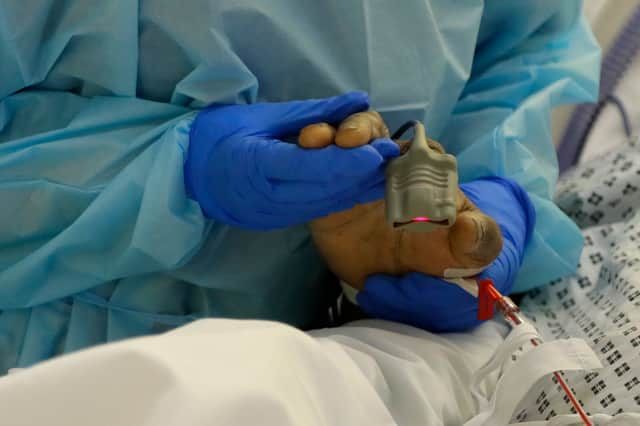Covid patients with learning disabilities may have been issued blanket ‘do not resuscitate’ orders


UK advocacy group Mencap has revealed that people with learning disabilities have been issued ‘Do Not Resuscitate’ (DNR) orders during the second wave of the pandemic.
A DNR or Do Not Attempt Cardiopulmonary Resuscitation (DNACPR) order refers to a document which is issued and signed by a doctor, informing a medical team not to attempt CPR. CPR is an emergency treatment which is used to restart someone’s heart if, for example, they should suffer from cardiac arrest, or suddenly die.
Advertisement
Hide AdAdvertisement
Hide AdMencap (which is a charity for people with learning disabilities) said it received reports in January from people with learning disabilities claiming they would not be resuscitated if they were taken ill with Covid-19, despite widespread condemnation of the practice last year, and investigation from the care watchdog.
‘Unacceptable to be applied in a blanket approach’
The Care Quality Commission (CQC) revealed in December 2020 that the number of complaints it had received about DNACPR orders jumped to 40 between March and September. During the six months prior there were just nine similar complaints.
Early results of the CQC’s investigation found that DNACPRs may have been used inappropriately, and that they had caused potentially avoidable deaths in 2020.
Rosie Benneyworth, Chief Inspector of Primary Medical Services and Integrated Care at the Care Quality Commission, said: “It is unacceptable for clinical decisions - decisions which could dictate whether someone’s loved one gets the right care when they need it most - to be applied in a blanket approach to any group of people.
Advertisement
Hide Ad“Sadly, in the experiences that people have generously shared with us, there is a very real concern that decisions were made which not only overlooked the wishes of the people they affected, but may have been made without their knowledge or consent.”
‘A duty to prevent avoidable deaths’
Advertisement
Hide AdIn an October 2020 briefing on equality and human rights in residential care during the Covid pandemic, the Equality and Human Rights Commission said: “The right to life is ‘non-derogable’, which means it must be maintained even in times of emergency.
“Public authorities have positive obligations to protect life, including a duty to prevent avoidable deaths.”
The parliamentary Joint Committee on Human Rights reported that it had “received deeply troubling evidence from numerous sources that during the Covid-19 pandemic, DNACPR notices have been applied in a blanket fashion to some categories of person by some care providers, without any involvement of the individuals or their families.”
Advertisement
Hide AdThe committee added that it is “discriminatory and contrary to both the ECHR and the Equality Act 2010 to apply DNACPR notices in a blanket manner to group on the basis of a particular type of impairment, such as a learning disability”.
‘Devastating effects on patients and families’
Usha Grieve, Director of Partnerships and Information at Compassion in Dying, said: “Coronavirus has highlighted and exacerbated ongoing problems with decision making and communication around DNRs, which have proliferated under a lack of clear, national guidance.
Advertisement
Hide Ad“This has had devastating effects on patients and families right across the spectrum - from DNRs being issued in a blanket way, to decisions not being properly communicated or explained to patients or families, to people who want to protect themselves from potentially harmful or futile CPR feeling ignored.”
‘Shocking discrimination’
Mencap claims that, long before the Covid-19 pandemic, people with a learning disability faced serious health inequalities, and that the CQC’s review of inappropriate DNRs is further evidence of the discrimination that they’ve faced during the pandemic.
Advertisement
Hide AdEdel Harris, Chief Executive of Medcap, said: “Throughout the pandemic many people with a learning disability have faced shocking discrimination and obstacles to accessing healthcare, with inappropriate DNACPR notices put on their files and cuts made to their social care support.
“It’s unacceptable that within a group of people hit so hard by the pandemic, and who even before Covid-19 died on average over 20 years younger than the general population, many are left feeling scared and wondering why they have been left out.
“The JCVI and the Government must act now to help save the lives of some of society’s most vulnerable people by urgently prioritising all people with a learning disability for the vaccine.”
‘Reveals a culture which fails to value vulnerable lives’
Advertisement
Hide AdA spokesperson from the Department of Health and Social Care said: “It is completely unacceptable for DNACPR decisions to be applied in a blanket fashion to any group of people.
Advertisement
Hide Ad“This has never been policy and we have taken action to prevent this from happening.”
Right to Life UK spokesperson, Catherine Robinson, said: “The apparent discrimination against people with learning disabilities, as found in this case, is shocking.
“The Department of Health is certainly saying all the right things in terms of its condemning of this practice, but that it happened in the first place, and according to Mencape at least, appears to still be happening to some degree, is atrocious.
“The CQC report expected later this year should give a better indication of the extent of the problem but if it really is the case that ‘blanket’ use of DNACPR was implemented for people with learning disabilities during the pandemic, it reveals dark attitudes that at least some people hold in the medical and caring professions and about the value of such people’s lives.
“It reveals a culture which fails to value the lives of the most vulnerable in society.”